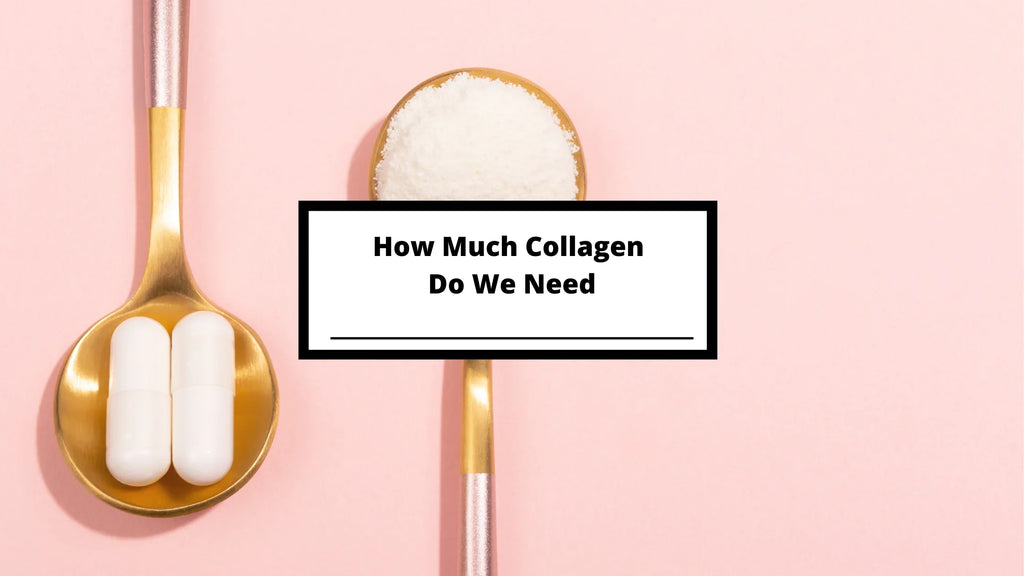How Much Collagen Do We Need

What is Collagen?
Collagen is a type of protein that makes up about 30% of your It's found in connect tissue, bones and cartilage--all areas that need to be flexible enough to move but strong enough to support your weight. Collagen provides structure for these tissues by forming long chains called collagen fibers; these fibers are then woven together into dense bundles called fibrils which give strength and elasticity to the tissue they surround.
Collagen production begins when fibroblasts (cells that produce collagen) secrete proteins called procollagen I molecules into the bloodstream where they travel throughout your body until they reach their destination: wherever you need more support! Once there, these procollagen I molecules join together with other molecules like lysine and hydroxyproline which help them fold into triple helixes (the shape we associate with DNA). These triple helices are then crosslinked by lysine residues on adjacent chains creating long strands known as fibrils--and voila! You have yourself some nice new tissue!
Benefits of Collagen
There are many benefits to collagen, but the most important one is that it helps with skin health. Collagen is a protein that makes up our connective tissue and keeps us looking young by keeping our skin firm and elastic. It also improves the appearance of scars, stretch marks, wrinkles and age spots--and it can even help fade acne scars!
Collagen also strengthens bones by increasing their density while decreasing bone loss as we age. This means that if you're trying to prevent osteoporosis or have recently experienced an injury that causes broken bones (like a fracture), collagen may be able to help heal them faster than normal so they don't become weak over time due to lack of use during recovery time periods like these where physical activity isn't possible yet either due pain levels being too high or other reasons such as needing surgery first before returning back into shape again later down road after healing has occurred fully enough for complete mobility again without risk factors present anymore."
Collagen Sources
Collagen is a protein that's found in your skin, bones and connective tissue. What is it?
- Collagen is what gives your body strength and structure.
- It helps keep your joints flexible so they don't become stiff as you age.
- It's also important for keeping your hair shiny and strong, as well as protecting the integrity of your nails and teeth (1).
There are many different ways to get collagen into your diet: supplements, liquid or through everyday foods.
How Much Collagen
There is no one-size-fits-all recommendation for collagen intake. The amount you need depends on your age and lifestyle factors, such as how active you are, if you're pregnant or breastfeeding, what medications you take and whether or not you have a medical condition that affects the absorption of nutrients into the body.
The recommended daily dosage for adults is 30 grams per day (about 3 tablespoons). If this sounds like a lot to take in at once--and it can be!--then try spreading out your intake throughout the day by adding more protein sources to meals or snacks (like Greek yogurt) and drinking bone broth regularly as well as taking supplements with each mealtime. Vieve Protein Water uses a collagen based protein and contains 20,000mg of collage per serving which is almost 1/3 of your daily recommended dose.
What are the Risks of Taking Too Much Collagen?
There are no known risks of taking too much collagen. However, if you have a medical condition or are taking medication, it's important to talk to your doctor before starting any new supplement.
If you're pregnant or breastfeeding, it's also important that you talk with your healthcare provider before using any supplements--including collagen--to make sure they're safe for both you and your baby.
Types of Collagen Supplements
There are many different types of collagen supplements. The most common forms are powders, capsules, tablets and liquids. You can also find creams and serums in the form of a gel that you apply directly to your skin.
The type you choose depends on how much time you want to spend taking care of yourself and what kind of results you're looking for. For example:
- Powders are easy to mix into drinks or smoothies but they take longer than other types because they need time for their ingredients to dissolve in liquid before being consumed by the body (about 15 minutes).
- If this doesn't bother you then this may be an option worth considering since it's cheaper than pills or tablets which require more processing at manufacturing facilities due to their size/shape difference from one another; however these options might not be as effective at delivering nutrients directly into cells due to their larger size compared with smaller particles such as those found inside pill capsules where all parts dissolve simultaneously once ingested orally through mouth contact alone without needing any additional mixing time required beforehand like with powders do after adding them onto food products containing water content already present within them such
- Liquids such as protein waters such as Vieve which are collagen based are another way to get collagen into your diet which is beneficial for when you are on the go
How to Choose the Right Collagen Supplement
When choosing a collagen supplement, there are four main things to consider:
- Ingredients. The first thing you should look at is the ingredients list. You want to make sure that your supplement contains only natural ingredients and no artificial additives or chemicals. It's also important to check that the product doesn't contain any harmful fillers like sugar orwhich can cause digestive issues).
- Quality. You should always choose high-quality products over cheaper ones--especially when it comes to something as important as your health! Low-quality supplements might not have enough of the active ingredient(s) necessary for positive results, which means you may end up wasting money on something that does nothing for your body.* Cost.* Safety.*
Collagen and Other Nutrients
Collagen is a protein, and like other proteins it needs vitamins and minerals to work properly. The body can't make collagen without them. For example:
Collagen requires vitamin C to produce lysine (an amino acid) that's needed for collagen production.
It needs zinc to produce copper which is needed for collagen production.
It needs magnesium so that calcium can be used in place of iron when making elastin (another type of protein found in skin).
Collagen for Skin Care
Collagen is the protein that keeps your skin looking young and healthy. It's what gives your skin elasticity, making it less likely to wrinkle or sag.
Collagen also helps reduce fine lines and wrinkles by keeping the dermis layer of your skin strong, plump and smooth. When you have enough collagen in your body, it can keep up with all of the stressors on your face--like UV rays from sunlight or pollution from city life--so they don't cause damage over time.
Conclusion
Collagen is the most abundant protein in the body and is responsible for keeping us healthy and youthful. It's found in all connective tissues, including skin, bones, muscles and tendons.
Collagen is also essential for our maintaining strength and flexibility. If want keep your looking young's that eat foods containing such as broth or gelatinous cuts of meat (like chicken breast). If you're vegetarian or vegan then there are many plant-based sources such as beans which contain soy protein isolate - this contains high levels of glycine which aids digestion while also helping reduce inflammation throughout your body due to its anti-inflammatory properties."
Vieve is the world's first high-protein drink and protein water to use collagen as its primary protein source, offering a true non-dairy alternative to whey and milk based drinks. Each bottle contains 20,000mg of hydrolysed collagen.
Our collagen powder mixes easily into everyday food & drink with just a tablespoon to give you an instant collagen-based protein boost.
Head over to our shop to check out our selection of protein drinks and protein waters. Find out more about Vieve here. Vieve Protein Water is available in the UK from Amazon, Ocado or direct from us!
